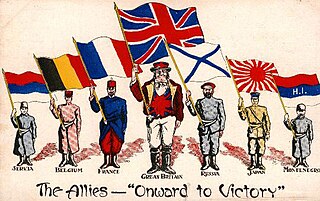
Ethnocentrism in social science and anthropology—as well as in colloquial English discourse—means to apply one's own culture or ethnicity as a frame of reference to judge other cultures, practices, behaviors, beliefs, and people, instead of using the standards of the particular culture involved. Since this judgment is often negative, some people also use the term to refer to the belief that one's culture is superior to, or more correct or normal than, all others—especially regarding the distinctions that define each ethnicity's cultural identity, such as language, behavior, customs, and religion. In common usage, it can also simply mean any culturally biased judgment. For example, ethnocentrism can be seen in the common portrayals of the Global South and the Global North.

George Ritzer is an American sociologist, professor, and author who has mainly studied globalization, metatheory, patterns of consumption, and modern/postmodern social theory. His concept of McDonaldization draws upon Max Weber's idea of rationalization through the lens of the fast food industry. He coined the term in a 1983 article for The Journal of American Culture, developing the concept in The McDonaldization of Society (1993), which is among the best selling monographs in the history of American sociology.

Consumerism is a social and economic order in which the aspirations of many individuals include the acquisition of goods and services beyond those necessary for survival or traditional displays of status. It emerged in Western Europe before the Industrial Revolution and became widespread around 1900. In economics, consumerism refers to policies that emphasize consumption. It is the consideration that the free choice of consumers should strongly orient the choice by manufacturers of what is produced and how, and therefore orient the economic organization of a society. Consumerism has been criticized by both individuals who choose other ways of participating in the economy and environmentalists concerned about its impact on the planet. Experts often assert that consumerism has physical limits, such as growth imperative and overconsumption, which have larger impacts on the environment. This includes direct effects like overexploitation of natural resources or large amounts of waste from disposable goods and significant effects like climate change. Similarly, some research and criticism focuses on the sociological effects of consumerism, such as reinforcement of class barriers and creation of inequalities.

In sociology and in economics, the term conspicuous consumption describes and explains the consumer practice of buying and using goods of a higher quality, price, or in greater quantity than practical. In 1899, the sociologist Thorstein Veblen coined the term conspicuous consumption to explain the spending of money on and the acquiring of luxury commodities specifically as a public display of economic power—the income and the accumulated wealth—of the buyer. To the conspicuous consumer, the public display of discretionary income is an economic means of either attaining or of maintaining a given social status.

Americentrism, also known as American-centrism or US-centrism, is a tendency to assume the culture of the United States is more important than those of other countries or to judge foreign cultures based on American cultural standards. It refers to the practice of viewing the world from an overly US-focused perspective, with an implied belief, either consciously or subconsciously, in the preeminence of American culture.
Monoculturalism is the policy or process of supporting, advocating, or allowing the expression of the culture of a single social or ethnic group. It generally stems from beliefs within the dominant group that their cultural practices are superior to those of minority groups and is often related to the concept of ethnocentrism, which involves judging another culture based on the values and standards of one's own culture, though this is usually untrue if cultural nationalism is dominant, as opposed to ethno-nationalism. It may also involve the process of assimilation whereby other ethnic groups are expected to adopt the culture and practices of the dominant ethnic group. Monoculturalism, in the context of cultural diversity, is the opposite of multiculturalism.
Glocalization or glocalisation is the "simultaneous occurrence of both universalizing and particularizing tendencies in contemporary social, political, and economic systems". The concept comes from the Japanese word dochakuka and "represents a challenge to simplistic conceptions of globalization processes as linear expansions of territorial scales. Glocalization indicates that the growing importance of continental and global levels is occurring together with the increasing salience of local and regional levels."

Consumer behaviour is the study of individuals, groups, or organisations and all the activities associated with the purchase, use and disposal of goods and services. Consumer behaviour consists of how the consumer's emotions, attitudes, and preferences affect buying behaviour. Consumer behaviour emerged in the 1940–1950s as a distinct sub-discipline of marketing, but has become an interdisciplinary social science that blends elements from psychology, sociology, social anthropology, anthropology, ethnography, ethnology, marketing, and economics.
The culture of capitalism or capitalist culture is the set of social practices, social norms, values and patterns of behavior that are attributed to the capitalist economic system in a capitalist society. Capitalist culture promotes the accumulation of capital and the sale of commodities, where individuals are primarily defined by their relationship to business and the market. The culture is composed of people who, behaving according to a set of learned rules, act as they must act in order to survive in capitalist societies.
Religiocentrism or religio-centrism is defined as the "conviction that a person's own religion is more important or superior to other religions." In analogy to ethnocentrism, religiocentrism is a value-neutral term for psychological attitude.

National identity is a person's identity or sense of belonging to one or more states or one or more nations. It is the sense of "a nation as a cohesive whole, as represented by distinctive traditions, culture, and language". National identity may refer to the subjective feeling one shares with a group of people about a nation, regardless of one's legal citizenship status. National identity is viewed in psychological terms as "an awareness of difference", a "feeling and recognition of 'we' and 'they'". National identity also includes the general population and diaspora of multi-ethnic states and societies that have a shared sense of common identity identical to that of a nation while being made up of several component ethnic groups. Hyphenated ethnicities are examples of the confluence of multiple ethnic and national identities within a single person or entity.

Country of origin (CO) represents the country or countries of manufacture, production, design, or brand origin where an article or product comes from. For multinational brands, CO may include multiple countries within the value-creation process.
Neotribalism, also known as modern tribalism or new tribalism, is a sociological concept which postulates that human beings have evolved to live in tribal society, as opposed to mass society, and thus will naturally form social networks constituting new tribes.
International business refers to the trade of Goods and service goods, services, technology, capital and/or knowledge across national borders and at a global or transnational scale.

Place branding is a term based on the idea that "cities and regions can be branded," whereby branding techniques and other marketing strategies are applied to "the economic, political and cultural development of cities, regions and countries." As opposed to the branding of products and services, place branding is more multidimensional in nature, as a 'place' is inherently "anchored into a history, a culture, an ecosystem," which is then incorporated into a network of associations, "linking products, spaces, organizations and people." As such, the concepts of nation branding, region branding, and city branding, fall under the umbrella term of place branding.
Consumer ethnocentrism is a psychological concept that describes how consumers purchase products based on country of origin.
EPG Model is an international business model including three dimensions – ethnocentric, polycentric and geocentric. It has been introduced by Howard V. Perlmutter within the journal article "The Tortuous Evolution of Multinational Enterprises" in 1969. These three dimensions allow executives to more accurately develop their firm's general strategic profile.
Product intelligence is defined as an automated system for gathering and analyzing intelligence about the performance of a product being designed and manufactured, such that this data is automatically fed back to the product managers and engineers designing the product, to assist them in the development of the next iteration or version of that product. The goal of product intelligence is to accelerate the rate of product innovation, thereby making the product and its owners more competitive and increasing customer satisfaction. Product intelligence is often applied to electronic products, but it is not necessarily limited to electronic products.
Theories of consumption have been a part of the field of sociology since its earliest days, dating back, at least implicitly, to the work of Karl Marx in the mid-to-late nineteenth century. Sociologists view consumption as central to everyday life, identity and social order. Many sociologists associate it with social class, identity, group membership, age and stratification as it plays a huge part in modernity. Thorstein Veblen's (1899) The Theory of the Leisure Class is generally seen as the first major theoretical work to take consumption as its primary focus. Despite these early roots, research on consumption began in earnest in the second half of the twentieth century in Europe, especially Great Britain. Interest in the topic among mainstream US sociologists was much slower to develop and it is still not a focal concern of many American sociologists. Efforts are currently underway to form a section in the American Sociological Association devoted to the study of consumption.
The country-of-origin effect (COE), also known as the made-in image and the nationality bias, is a psychological effect describing how consumers' attitudes, perceptions and purchasing decisions are influenced by products' country of origin labeling, which may refer to where: a brand is based, a product is designed or manufactured, or other forms of value-creation aligned to a country. Since 1965, it has been extensively studied by researchers.








